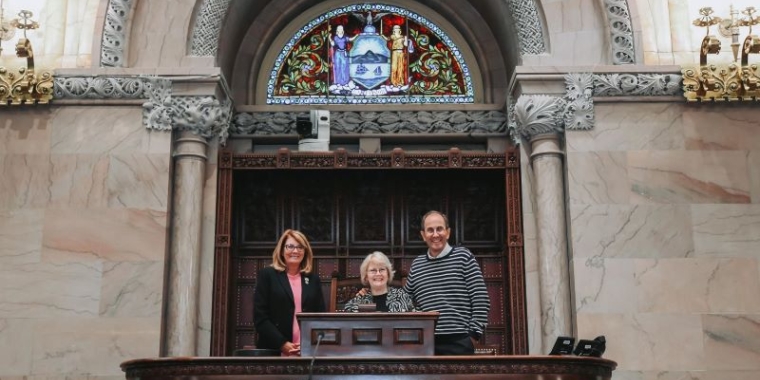
Senator Helming Calls for Stop to Electric School Bus Mandate
February 12, 2024

In support of local property taxpayers and school districts, Senator Helming continues to speak out against the electric school bus mandate in New York State. The mandate requires new school buses purchased to be zero emission by 2027 and all school buses in operation to be electric by 2035.
Senator Helming, along with Senator George Borrello and members of the Republican Conference, is proposing an alternate path forward. She co-sponsors legislation (S.8467) that would rescind the mandate and instead launch a state-funded pilot program to evaluate the performance and feasibility of electric school buses in rural, urban and suburban settings.
Senator Helming said, “My local schools are raising the alarm about this mandate and we should listen to them. It’s unrealistic, uninformed and irresponsible. And, it’s set to begin in just three years. Districts are planning now for how to implement and afford it, with little guidance or funding from the state. One electric school bus costs upwards of $400,000, and up to $30,000 more per bus for the needed infrastructure. Not to mention whether our electric grid has the necessary capacity. This mandate is a steep climb and it’s going to push our school districts and property taxpayers right off the cliff.”
On behalf of the Genesee Valley Chief School Officers Association, Robert Molisani, Caledonia-Mumford Central School District Superintendent, said, “The GVCSOA supports clean energy initiatives that provide financial assistance to schools and realistic timelines. Governor Hochul’s bus electrification ambitions present a myriad of complexities. Inadequate energy infrastructure, capital funding, electric bus manufacturing challenges, high costs, limited range, public resistance, and an unrealistic 2027 deadline for zero emissions bus purchases pose significant obstacles.”
Molisani continued, “Furthermore, the bus electrification goals are blind to the significant investment of taxpayer dollars and progress made by school districts that have switched to low emissions propane bus fleets. The GVCSOA urges the state and Governor Hochul to reassess the feasibility and timeline of bus electrification and consider the practical challenges faced by rural school districts. We further encourage providing a diverse group of school districts with the funding and assistance to pilot school bus electrification. We strongly support Senator Helming’s alternate path forward.”
Shawn Van Scoy, Gananda Central School District Superintendent, said, “The 25 school districts in our area project a cost of $150 million over the next 10 years just to purchase the buses. We are deeply concerned that funding this initiative will require that the school districts divert funds from instructional programs. Schools in New York State are charged with the education of our children, we are not designed to be incubators for the state’s unproven energy projects. If the state believes this is a priority, then it must provide a concrete plan to pay for these buses that does not divert money from other state aid. Senator Helming’s proposed pilot program would be a good way to identify what changes are needed.”
According to a report by the Empire Center, the transition to electric school buses will cost between $8 and $15 billion above the cost of buying traditional buses.
Senator Helming said in addition to cost and infrastructure concerns, the following also need to be addressed:
- Safety and reliability: A report by Consumer Reports found that electric vehicles have nearly 80% more problems and are generally less reliable than conventional vehicles.
- Operating in cold weather: According to AAA, electric vehicles can lose up to about 40% of their range when the temperature drops from 75 degrees to 20 degrees Fahrenheit. A pilot program in Vermont found that electric school buses lose up to 80% of their range in cold temperatures.
- Unique needs of rural districts: With a traveling range of about 100 miles, and without sufficient charging infrastructure, electric school buses are not suited to meet the full range of student transportation needs in rural areas.
“The bottom line? The technology and the infrastructure are simply not there yet, and are unlikely to be in just three years’ time. I want to do everything we can to protect our environment, but this mandate is impractical. Let’s be smart about this and let’s protect our students, schools and property taxpayers,” Senator Helming concluded.
###
related legislation
Share this Article or Press Release
Newsroom
Go to Newsroom


